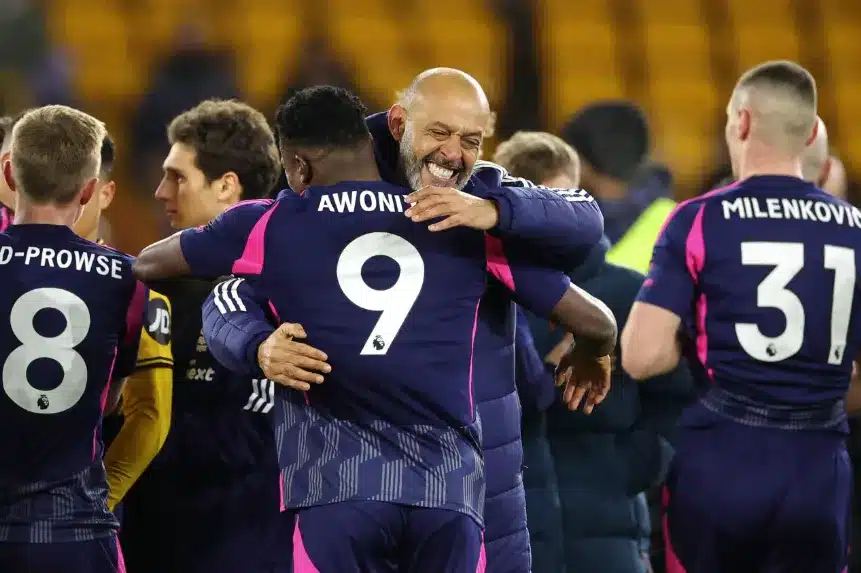In a Premier League era defined by squad rotation and frantic transfer activity, Nottingham Forest are breaking all the rules. While many expected Forest to struggle after their promotion spending spree, they’ve quietly become the league’s most consistent team in selection – and it’s propelling them toward an improbable Champions League qualification. Krikya brings you the inside story on how Nuno Espirito Santo’s methods are revolutionizing Forest’s approach.
The Consistency Conundrum: Fewest Players, Maximum Impact
While Nottingham Forest became something of a punchline for their extensive recruitment under Evangelos Marinakis, the statistics tell a completely different story this season. Forest have used fewer players than any other Premier League club, creating a stability that’s become their secret weapon in the race for European football.
Five key players have started at least 23 of Forest’s 24 Premier League matches this campaign: goalkeeper Matz Sels, center-back pairing Nikola Milenkovic and Murillo, full-back Ola Aina, and top scorer Chris Wood. This core group has provided the foundation for Forest’s remarkable consistency, giving them a six-point advantage over reigning champions Manchester City with just 14 games remaining.

Nuno’s Philosophy: Less Rotation, More Understanding
The temptation might be to attribute Forest‘s consistency to mere luck or the absence of European distractions. However, those familiar with Nuno Espirito Santo’s managerial history recognize this as a deliberate strategy born from years of refinement.
During his successful stint at Wolves in the 2019/20 season, Nuno managed 11 players who made 33 or more Premier League appearances despite competing in 17 Europa League matches. This approach yielded back-to-back seventh-place finishes, establishing Wolves as a formidable Premier League force.
“More complexities, small societies. That comes from hours and hours on the training ground, hours playing together,” Nuno explained in a previous interview. “It becomes a routine that becomes a habit and your habits become your character.”
This philosophy translates directly to on-field understanding. When Anthony Elanga crosses the ball, he knows Chris Wood’s movement patterns instinctively. When Morgan Gibbs-White receives possession, he anticipates his teammates’ runs without needing to look. These subtle understandings, developed through consistent time together, create marginal gains that accumulate over a season.
The Tactical Masterstroke: Conserving Energy Through Compactness
What makes Forest‘s approach particularly fascinating is how it connects to their tactical identity. While other top teams press aggressively and cover substantial ground, Forest have adopted a more conservative approach that prioritizes positional discipline over relentless energy expenditure.
Statistics reveal that Forest cover the least distance of any Premier League team this season – a direct continuation of Nuno’s trend-setting approach at Wolves, who were similarly economical in their movement. This isn’t about lethargy or poor work rate; it’s about intelligent positioning and maintaining compact defensive shapes.
No team allows opponents more passes before making a defensive action than Forest. They’re content to surrender possession in areas where they maintain defensive control, effectively inviting opponents forward to create space for devastating counter-attacks. This approach was perfectly exemplified in their stunning 7-0 victory over Brighton, achieved with just 37.4% possession.
The Physical Advantage: Fewer Injuries, More Availability
The physical benefits of Forest‘s approach are becoming increasingly apparent. While high-pressing teams like Tottenham suffer from muscle injuries at an alarming rate, Forest enjoy the Premier League’s best availability record. Their conservative defensive approach and consistent selection create a virtuous cycle: players avoid the physical toll of aggressive pressing, stay healthier, and maintain their understanding through continued time together.
Former Premier League fitness coach Mark Thompson notes: “There’s a direct correlation between high-intensity running and muscle injuries. Teams that prioritize compact defensive shapes rather than aggressive pressing tend to suffer fewer soft tissue problems. Nuno has mastered this balance.”
Bournemouth’s similar pressing approach shows that aggressive tactics can work, but they’ve achieved success despite considerable injury problems. Forest’s method provides both immediate results and sustainable player availability – a combination that could prove decisive in the final months of the season.

Sustainability Questions and the Road Ahead
Despite Forest’s impressive position, questions remain about whether their current form is sustainable. Bookmakers still rate them as underdogs for top-four qualification, and expected-goals data suggests other teams might be more deserving of Champions League football.
However, to dismiss Forest‘s success as mere coincidence would be a mistake. Nuno’s historical track record suggests his methods consistently yield overachievement relative to squad talent and resources. If he can maintain his strongest players’ availability – and history suggests he can – Forest might continue to surprise the Premier League establishment.
Krikya analysis suggests that Forest’s approach represents a fascinating alternative to the pressing dogma that has dominated modern football thinking. In an era where squad rotation and high-intensity pressing are often viewed as necessary for success, Forest are proving that consistency, compactness, and conservation can be equally effective.
Conclusion: Nottingham Forest’s Blueprint for Success
Nottingham Forest’s remarkable consistency under Nuno Espirito Santo represents more than just a surprising story – it offers a compelling alternative vision of how to achieve success in the modern Premier League. While their Champions League qualification is far from guaranteed, their approach has already yielded remarkable results that defy conventional wisdom.
The combination of selection consistency, tactical discipline, and physical sustainability has created a perfect storm of overachievement at the City Ground. As the season enters its decisive phase, Forest’s ability to keep their key players fit and understanding each other’s games might just be the difference between European qualification and missing out.
What do you think about Forest’s chances of maintaining their top-four challenge? Can consistency overcome financial might in the modern Premier League? Share your thoughts with the Krikya community and join the conversation about one of the season’s most fascinating stories.

